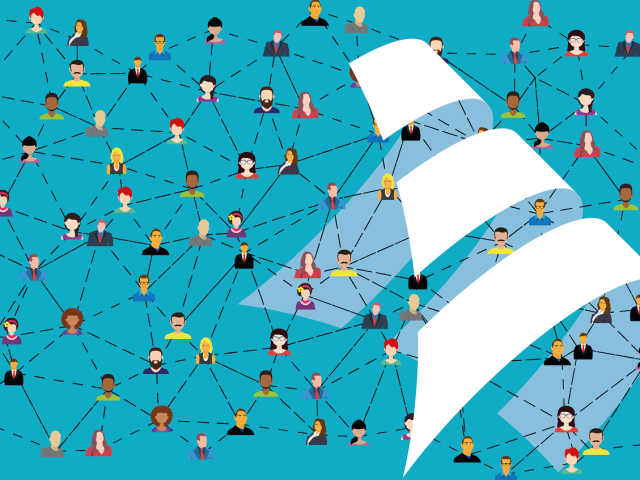
Data making a difference: the world-leading data bank behind life-changing research
Data on national screening programmes, prescriptions, waiting times, hospital appointments and admissions is being used in research across Wales to change lives.
The Secure Anonymised Information Linkage (SAIL) Databank holds a wealth of anonymised data collected from people in Wales over the past 30 years. This data comes from health and social care, care homes, registers and audits, specialist services and surveys, which can be anonymously linked to provide a clear picture of the health and social care setting in Wales.
SAIL data has been used widely in a range of research studies focusing on health and wellbeing, including COVID-19 vaccines/treatments, the impact of air pollution, dementia, epilepsy, cystic fibrosis and asthma. It can be used to study groups of people with particular characteristics or conditions, such as pregnant women or people over the age of 70 living with dementia, enabling comparisons between groups or over periods of time.
The SAIL Databank was set up by the Health Informatics Group at Swansea University Medical School in 2007 with funding from Health and Care Research Wales.
Professor David Ford, Co-Director of the SAIL Databank, said: “The SAIL Databank was created in recognition of the huge, untapped data collected on individuals as part of everyday health service delivery. By making this enormous data collection linkable and safely accessible, SAIL helps researchers answer important questions that couldn’t otherwise be addressed without great cost and effort.
“SAIL now includes billions of records from around five and a half million people who have accessed public services in Wales. We’re so proud that its comprehensiveness and advanced analytical features mean it is widely recognised as one of the best population databanks in the world.
“It covers 100% of all patient data collected in Welsh hospitals and secondary care settings, and 85% of data collected in primary care general practice. SAIL has supported over 1,300 approved researchers resulting in over 500 research publications. Our efforts supporting the COVID-19 response, marked 2020 as our busiest year to date; supporting just over 100 approved research projects.”
Here in Wales, Health and Care Research Wales funded organisations and researchers use SAIL data in ground-breaking research projects that cover all aspects of life.
The National Centre for Population Health and Wellbeing (NCPHWR), PRIME Centre Wales, Centre for Trials Research, DECIPHer and Swansea Trials Unit are just some examples of how researchers in Wales use SAIL data to make a difference.
Wellbeing for new mums
Researchers at the NCPHWR are using SAIL data in the Born in Wales study. Expectant mums and partners are asked to complete an online questionnaire about their health, wellbeing and lifestyle. The survey includes questions about employment, experiences of services received, health and wellbeing and other background information such as age and ethnicity. This information is combined with SAIL data on birth registrations, child health examinations and immunisations, NHS hospital admissions and GP records. The findings will provide evidence for health care professionals and policymakers on supporting families to give children the best start in life.
Mental health of care workers
SAIL data was used by researchers at the Centre for Trials Research at Cardiff University in a study to assess the health of 20,000 domiciliary care staff in Wales. This study analysed COVID-19 infection, mental health and other illnesses of care workers for the elderly or people with life-limiting conditions in their homes. The researchers used both linked population-scale health record data with domiciliary social care workforce data to inform results around safer working practices and additional support for staff both in Wales and in other UK nations.
Children’s experience of mental health
A study which discovered the increased risk of children developing mental ill-health when living with someone with mental health challenges was underpinned by SAIL data. The Adverse childhood experiences and child mental health: an electronic birth cohort study, led by DECIPHer at Cardiff University, showed children who had grown up living with someone with mental health difficulties were 63% more likely to experience their own mental health issues. Researchers used SAIL Databank to analyse hospital admission and GP records which tracked 190,000 children living in Wales from birth up to age 15. The study examined mental health symptoms, diagnoses and treatments and developmental disorders such as learning disabilities. These findings will inform policy makers in implementing support strategies for children and families in Wales.
Sun safety in Welsh primary schools
SAIL data will be used in a study looking at sun safety policy in Welsh primary schools. Led by Swansea Trials Unit, the study aims to understand how primary schools in Wales are responding to the growing problem of skin cancer. Researchers will use SAIL data to analyse incidences of serious sunburn in children and explore whether schools have a sun protection policy in place, the factors which may influence this, what these policies look like and whether they have an impact on the awareness, knowledge and behaviour of children, staff and school managers. They will use study findings to co-produce guidance for schools.
Frequent 999 calls
A PRIME Centre Wales study (STRETCHED), will use SAIL data to assess how to respond to a small number of people who frequently call 999 often without needing urgent treatment. These people may be vulnerable and call 999 because available services to do not meet their complex needs. Some ambulance services have introduced case management, which includes referring frequent callers to different services such as social services, GPs or community mental health services. Using SAIL data, researchers will see if frequent callers have fewer emergency episodes when case management is available, assess the safety of this approach and determine associated costs and savings.
For more information on SAIL Databank click here.